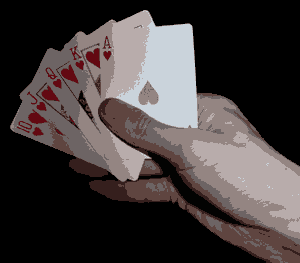Wild Card Poker Paradox

This is not the most exciting paradox you will come across at curiouser.co.uk. However it is one of the less well known paradoxes, and it should be of interest to anyone who plays poker or has a mathematically curious mind for the paradoxical.
In poker hands are ranked according to the frequency with which they occur when one is dealt 5 random cards from a standard deck – the lower the probability of receiving a hand, the higher the hand is ranked. When wild cards are introduced, it becomes impossible to rank the hands according to their frequency; there will always be at least one hand that is ranked below a hand of higher frequency.
For a normal deck of 52 cards the frequencies/probabilities are easily calculated and result in the following hierarchy of hands:
| Ranking of Poker Hands and Their Frequencies of Occurrence | ||
| Hand | # of Ways | Probability |
| Straight Flush | 40 | 0.000015 |
| Four of a Kind | 624 | 0.000240 |
| Full House | 3,744 | 0.001441 |
| Flush | 5,108 | 0.001965 |
| Straight | 10,200 | 0.003925 |
| Flush | 5,108 | 0.001965 |
| Three of a Kind | 54,912 | 0.021129 |
| Two Pair | 123,552 | 0.047539 |
| One Pair | 1,0098,240 | 0.422569 |
| High Card/Junk | 1,302,540 | 0.501177 |
| Total (sum): | 2,598,960 | 1 |
See appendix 1 for calculations
“Wild cards” are sometimes introduced to a deck in order to liven up a game. These cards (which are often jokers but can be any of the standard 52 cards) can then be used to count as any card, thus increasing the probability of making a high-ranking hand.However, by introducing wild cards a paradox is created:
Let us assume that we introduce one joker as a wild card (WC) and retain the standard hierarchy of hands as tabled above. If one were to be dealt 2D 2C 6S 8H WC, one would have a choice as to whether to call the WC an 8 (making 2 pair) or a 2 (making 3 of a kind). Obviously, one would choose whichever hand had the highest rank, which in this case would be three of a kind, but by doing this, one actually makes frequency of a two pair hand less frequent than a Three of a Kind hand, which ought to rank two of a kind above three of a kind in the hierarchy. However, if one changes the ranking in this way, so that two of a kind ranks above three of a kind, three of a kind immediately become less frequent again and should therefore be ranked above Two of a Kind. No matter whatever hierarchy of hands is introduced, the probabilities/frequencies are always incompatible.
The following table shows the standard hierarchy of 5 card poker hands with their probabilities of occurrence.
Introducing a Wild Joker
The table below shows what happens to the frequencies when a joker is introduced to the deck as a wild card.
| Frequency for Two Rankings with One Joker Wild | ||||
| Ranking | Frequency | Ranking | Frequency | |
| 5 of K. | 13 | 5 of K. | 13 | |
| Str. Fl. | 184 | Str. Fl. | 184 | |
| 4 of K. | 3,120 | 4 of K. | 3,120 | |
| F. H. | 6,552 | F. H. | 6,552 | |
| Flush | 7,804 | Flush | 7,804 | |
| Straight | 20,532 | Straight | 20,532 | |
| 3 of K. | 137,280 | 2 Pair | 205,920 | |
| 2 Pair | 123,552 | 3 of K. | 54,912 | |
| 1 Pair | 1,268,088 | 1 Pair | 1,268,088 |
The number of possible hands has now increased to 53C5 = 2,869,685. However, the declaration of a hand which contains a wild card (and therefore the hand’s frequency) will now depend on the ranking. For example: if one holds 2C 2H 6D JS WC, one could either declare the wild card to be a J or a 2 depending on whether three of a kind or two pair had the higher rank.
See appendix 2 for calculations and further explanation.
Although not shown on here, similar anomalies arise using 2 Jokers, “Deuces Wild” and other wild card variations. An interesting observation is that when using two jokers wild, if Four of a Kind is ranked above a Full House (as it is naturally), the frequency of both hands is exactly the same (9360 ways; probability = 0.0030). It is also interesting to note that the more wild cards used, the lower the frequency of flushes becomes, as four of a kind and full houses become more common.
RESOLUTION, APPENDICES & FURTHER READING
© 2000 curiouser.co.uk All rights reserved.